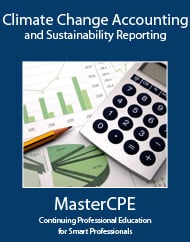Course Information
Climate Change Accounting and Sustainability Reporting
Course Information
| Title: | Climate Change Accounting and Sustainability Reporting |
|---|---|
| Category: | Accounting and Auditing |
| Field of Study: | Accounting |
| Course Code: | M144 |
| CPE Credits: | 3.0 |
| Price: | 27.95 |
Description
Description:
Climate-change and sustainability are topics that are increasingly on the minds of investors and other stakeholders. Companies are increasingly subject to nonfinancial reporting requirements relating to environmental, social and governance factors. For example, sustainability reporting requirements are increasingly impacting the investment and lending activities of global financial institutions. Investors now expect businesses to frame decisions in terms of environmental, social, and human impact for the long-term, rather than on short-term gains such as next quarter’s earnings report. This course reviews the prevailing sustainability reporting and the nonfinancial reporting frameworks.
This course also reviews the accounting for climate‑change risks under U.S. Generally Accepted Accounting Principles (U.S. GAAP) and International Financial Reporting Standards (IFRS). While these Standards do not cover climate‑change risks and other emerging risks explicitly, they do address issues that relate to them. This course reviews the application of those Standards and the related guidance on materiality to climate and other emerging risks.
Delivery Method: Online Interactive Self Study
Level: Overview
Prerequisites: None
Advanced Preparation: None
Course Details
Category: Accounting and Auditing
Field of Study: Accounting
Passing Score: 70%
Technical Details: Accounting: Technical
For More Detail:
If you are unable to view PDF then right click the mouse and click save link as
Objectives
Objectives:
- Identify the potential economic impacts and financial risks of climate change.
- Recognize disclosure practices that are consistent with leading sustainability reporting
- Identify areas of accounting and financial statement disclosures that are impacted by climate-related and other emerging risks
For More Objectives:
If you are unable to view PDF then right click the mouse and click save link as
Profession
NASBA: Yes
QAS: Yes
CPA: Suitable for all CPAs
IRS: No IRS credit for Enrolled Agents.
Profession Identifiers: CPA

